

The Forgotten Kaleidoscope Craze in Victorian England. Jon Ronson in Conversation with Adam Curtis. This article first appeared on VICE UK I've known Adam Curtis for nearly 20 years.

We're friends. We see movies together, and once even went to Romania on a mini-break to attend an auction of Nicolae Ceausescu's belongings. Blogs - Adam Curtis - NOW THEN. The truth is out: money is just an IOU, and the banks are rolling in it. Back in the 1930s, Henry Ford is supposed to have remarked that it was a good thing that most Americans didn't know how banking really works, because if they did, "there'd be a revolution before tomorrow morning".

Last week, something remarkable happened. The Bank of England let the cat out of the bag. In a paper called "Money Creation in the Modern Economy", co-authored by three economists from the Bank's Monetary Analysis Directorate, they stated outright that most common assumptions of how banking works are simply wrong, and that the kind of populist, heterodox positions more ordinarily associated with groups such as Occupy Wall Street are correct. Bank of England Quarterly Bulletin 2014 Q1 - qb14q102.pdf. Tariq Ramadan asks: how can different religious traditions move beyond tolerant co-existence to mutual respect and enrichment? How He Got It Right by Andrew Hacker. Human cycles: History as science. Sometimes, history really does seem to repeat itself.
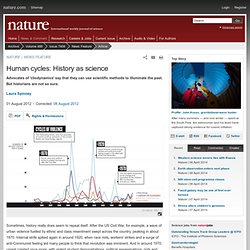
Graphing the history of philosophy « Drunks&Lampposts. A close up of ancient and medieval philosophy ending at Descartes and Leibniz.
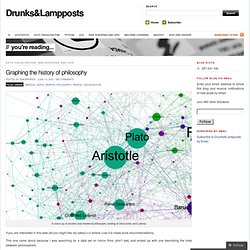
Official Podcast of New York City Skeptics - Current Episodes - RS21 - Joshua Knobe on Experimental Philosophy. Release date: November 7, 2010 Our guest, Joshua Knobe, is a philosopher interested in cognitive science, so interested, in fact, that he has contributed to establishing a whole new branch of inquiry known as experimental philosophy — and he plausibly claims that the name is not actually an oxymoron!
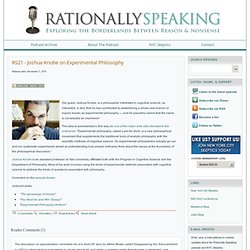
The idea is summarized in this way on one of the major web sites devoted to the enterprise: "Experimental philosophy, called x-phi for short, is a new philosophical movement that supplements the traditional tools of analytic philosophy with the scientific methods of cognitive science. So experimental philosophers actually go out and run systematic experiments aimed at understanding how people ordinarily think about the issues at the foundation of the philosophical discussion.” Joshua Knobe is an assistant professor at Yale University, affiliated both with the Program in Cognitive Science and the Department of Philosophy. Michael Specter: The danger of science denial. The Future of Moral Machines. The Stone is a forum for contemporary philosophers and other thinkers on issues both timely and timeless.
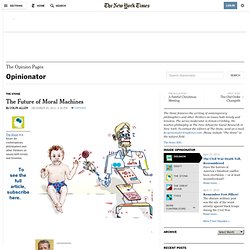
Are jobs obsolete? TED. Flow. The myth of closure. The Six Habits of Highly Empathic People. Richard Dawkins on vivisection: "But can they suffer?" The great moral philosopher Jeremy Bentham, founder of utilitarianism, famously said,'The question is not, "Can they reason?
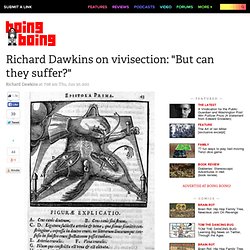
" nor, "Can they talk? " but rather, "Can they suffer? " David Deutsch: A new way to explain explanation. The 14 Defining Characteristics Of Fascism. Garbage and Gravitas. St.
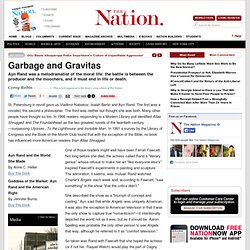
Petersburg in revolt gave us Vladimir Nabokov, Isaiah Berlin and Ayn Rand. The first was a novelist, the second a philosopher. The third was neither but thought she was both. Many other people have thought so too. In 1998 readers responding to a Modern Library poll identified Atlas Shrugged and The Fountainhead as the two greatest novels of the twentieth century—surpassing Ulysses, To the Lighthouse and Invisible Man.
Ayn Rand and the World She Made By Anne C. Goddess of the Market: Ayn Rand and the American Right By Jennifer Burns.Buy this book About the Author. French Theory in America - Stanley Fish - Think Again - Opinion - New York Times Blog. It was in sometime in the ’80s when I heard someone on the radio talking about Clint Eastwood’s 1980 movie “Bronco Billy.”
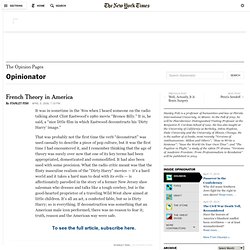
Multiple initiatives vie to give scientists unique IDs - Ars Technica. Ars' science staff loves the Digital Object Identifier system that's used for scientific publications.

Each paper gets its own unique ID, and plugging that into the doi.org site will resolve it to the paper, even if the original journal changes its name, moves the paper to a new URL, or what have you. Aside from helping one find an original research paper, the DOI is powerful as a tool for finding related information. A simple search for a DOI can identify a whole host of articles that comment on the paper. If it's useful for papers, imagine what a DOI for authors could do. Authors have a far more complex history than papers.
Conflicting ways of finding authors. Trust and reputation systems: redistributing power and influence - People use social networking tools to figure out who they can trust and rely on for decision making. By the end of this decade, power and influence will shift largely to those people with the best reputations and trust networks, from people with money and nominal power. That is, peer networks will confer legitimacy on people emerging from the grassroots. This shift is already happening, gradually creating a new power and influence equilibrium with new checks and balances. It will seem dramatic when its tipping point occurs, even though we're living through it now. Everyone gets a chance to participate in large or small ways, giving a voice to what we once called "the silent majority. "
CommunityStabilization. Procrastination. Idleness. NeutralPointOfView. UnityOfConsciousness. Existentialism. Viridian.